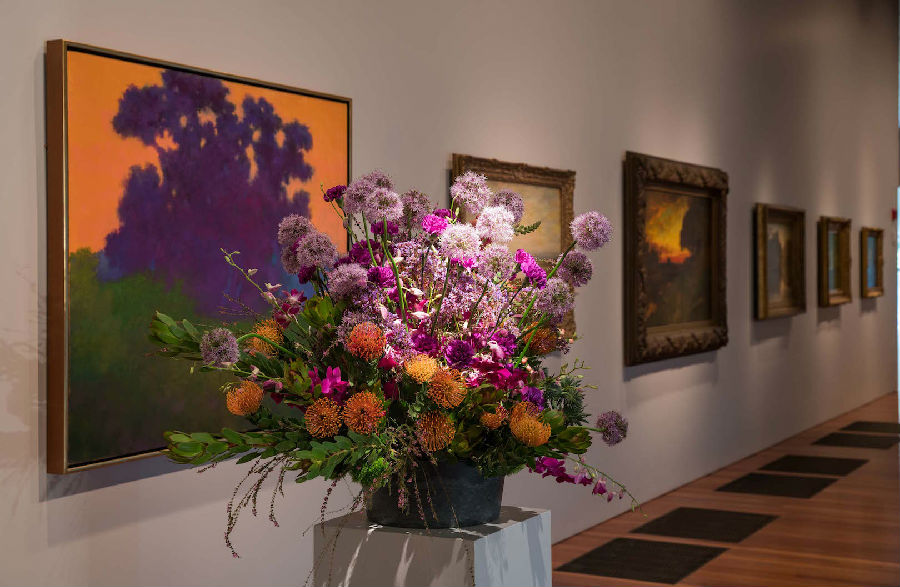A San Francisco museum tackles art’s Instagram dilemma
舊金山博物館解決了藝術(shù)空間的拍照發(fā)圈困境
A WOMAN CLUTCHED HER PHONE TO HER heart, the way a missionary might hold a Bible.
一個(gè)女人把手機(jī)拿在胸前,就像傳教士拿著《圣經(jīng)》那樣。
She was anxious to take a picture of a stunning bouquet of flowers that sat not 10 ft. away,
她急著想拍張她面前10英尺(約3米)外的一束非常漂亮的花,
but first she had to get through a crowd of others jostling to do the same.
但首先,她必須穿過一群爭(zhēng)先恐后和她有著同樣心思的人群。
The cause of this recent frenzy was Bouquets to Art, one of the most popular annual events at the de Young Museum in San Francisco.
引發(fā)最近這一狂潮的是“從鮮花到藝術(shù)”展覽,舊金山狄楊博物館一年一度最受歡迎的展覽之一。
For the 34th year, florists were asked to create bouquets that respond to pieces of art on display, from ancient carvings to contemporary sculptures.
在第34屆展覽上,花藝師們被要求制作能夠呼應(yīng)展出的藝術(shù)作品的花束,無論是古代的雕刻作品,還是當(dāng)代的雕塑。
A tower of baby's breath imitates a frothy waterfall in a nearby painting by Gustav Grunewald.
一座嬰兒氣息塔模仿的是旁邊的古斯塔夫·格魯內(nèi)瓦爾德畫作中的瀑布。
Red flamingo flowers and neon blue sticks echo a surreal portrait of a woman by Salvador Dalí.
火鶴花和霓虹藍(lán)樹枝呼應(yīng)的是薩爾瓦多·達(dá)利的超現(xiàn)實(shí)主義女子畫像。
It's entrancing and also extremely Instagrammable, to the point that it has become a problem.
這一展覽確實(shí)精彩奪目,用來發(fā)朋友圈再好不過了,以致于這種趨勢(shì)已經(jīng)成為了展覽的一個(gè)問題。
In recent years, the de Young received more than a thousand complaints from people who felt that cell phones had tainted their experience of the exhibit.
近年來,狄楊博物館收到了一千多例投訴,投訴者們紛紛稱手機(jī)已經(jīng)污染了他們的看展體驗(yàn)。
Institutions of fine art around the world face similar problems
世界各地的藝術(shù)機(jī)構(gòu)都面臨著類似的問題,
as the desire to take photographs becomes a huge draw for museums as well as something that upsets some of their patrons.
因?yàn)榕恼盏挠闪艘恍┤巳ゲ┪镳^的巨大動(dòng)力,也成了另外一些老顧客心煩的原因。
So the de Young responded with a kind of compromise:
于是,狄楊博物館采取了一個(gè)中間辦法:
carving out "photo free" hours during the exhibition's six-day run (which is short because of flowers' perishable nature).
在展覽的六天時(shí)間(因?yàn)轷r花容易枯萎,所以展覽時(shí)間很短)里抽出“無拍照”時(shí)間。
One common complaint in the ongoing debates over the effect of social media on museum culture
目前,針對(duì)社交媒體對(duì)博物館文化的影響展開的辯論中一個(gè)普遍的怨言
is that people seem to be missing out on experiences because they are so busy collecting evidence of them.
是人們似乎錯(cuò)過了體驗(yàn),因?yàn)榇蠹叶荚诿χ占麄兊竭^博物館的證據(jù)。

An oft-cited study published in the journal Psychological Science suggests there is some truth to this;
一項(xiàng)發(fā)表在《心理科學(xué)》雜志上,后來被反復(fù)引用的研究表明,此話并非沒有道理;
it found that people who took photos of an exhibit rather than simply observing it had a harder time remembering what they saw.
該研究發(fā)現(xiàn),那些看展時(shí)拍照片而不是單純地欣賞展覽作品的人很難記住他們看過什么。
But the issue is complicated for the professionals running museums.
然而,對(duì)于經(jīng)營(yíng)博物館的專業(yè)人士來說,這個(gè)問題并不簡(jiǎn)單。
Linda Butler, the de Young's head of marketing, communications and visitor experience, acknowledges that not everyone wants a museum to be "a selfie playland."
德楊的市場(chǎng)營(yíng)銷,傳播和訪客體驗(yàn)負(fù)責(zé)人琳達(dá)·巴特勒承認(rèn),并非所有人都希望博物館成為“自拍樂園”。
Yet a lot of other people do,
然而,還是有很多人希望如此,
and her take is that the de Young is in no position to assert that one motivation for buying a $28 ticket is more valid than another.
她的理解是,笛揚(yáng)博物館沒有資格斷定購(gòu)買28美元門票的一種動(dòng)機(jī)比另一種動(dòng)機(jī)更正當(dāng)。
If we removed social media and photography, she says, "we would risk becoming irrelevant."
“如果我們拿掉社交媒體和拍照,”她說,“我們就將面臨變得無關(guān)緊要的風(fēng)險(xiǎn)。”
If this is a battle, signs indicate that the pro-phone crowd has already won.
如果這是一場(chǎng)戰(zhàn)斗,跡象表明,親手機(jī)人群已經(jīng)贏得了這場(chǎng)戰(zhàn)爭(zhēng)。
On this visit to the museum, most people seemed to treat the photo bonanza as the new normal.
這次去參觀博物館時(shí),大多數(shù)人似乎都將拍到好照片當(dāng)成了新常態(tài)。
Many politely waited their turn and got out of other people's shots, even as visitors bumped into each other in cramped galleries.
很多人都會(huì)禮貌地等他們拍照的機(jī)會(huì),并且禮貌地避開他人的鏡頭,即使訪客在狹窄的畫廊中碰撞到彼此。
Morgan Holzer, a millennial who was surprised by the furor,
摩根·霍爾澤,一位對(duì)這種憤怒感到十分驚訝的千禧一代,
said that as she approached bouquets to read their labels, she found herself holding up the process.
說當(dāng)她走近花束去看它們的標(biāo)簽時(shí),她注意到自己妨礙了別人拍照。
But rather than expressing frustration about this awkwardness,
但她并沒有對(duì)這種尷尬表示失望,
she said she felt guilty, as if she were the one defying convention.
她反而覺得自己很內(nèi)疚,好像自己很特立獨(dú)行一樣。
"I felt bad blocking everyone's photo," she said.
“妨礙別人拍照的時(shí)候我會(huì)覺得很不好意思,”她說。
譯文由可可原創(chuàng),僅供學(xué)習(xí)交流使用,未經(jīng)許可請(qǐng)勿轉(zhuǎn)載。


